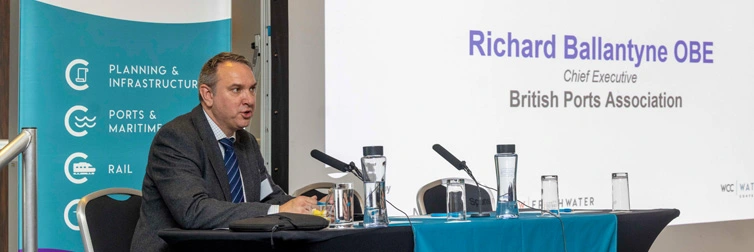
Technology, Trump’s Tariffs and TV Documentaries: What happened on day one of UK Ports?
The cream of the UK ports and maritime sector gathered yesterday (4 June) at London’s Royal National Hotel, for the 17th annual UK Ports Conference, organised by Freshwater’s sister company, Waterfront Conference Company.
Against a backdrop of turbulence in international trade, ongoing efforts to decarbonise shipping and port operations and a government hungry for economic growth, the two-day event is providing an opportunity for industry stakeholders and opinion formers to grapple with the issues of the day and plot a course to future prosperity.
The British Ports Association set the tone, with its CEO, Richard Ballantyne setting the scene and introducing newly-appointed Chair, Doug Bannister from the Port of Dover, who reflected on some of the latest government policies, global forces and industry trends currently impacting the sector.
The UK’s ports represent a vast network of infrastructure, industries and people; each with their own unique attributes and ownership models, yet many of them are facing the same challenges and opportunities.
Research guru, Trevor Crowe, reported that the last 12 months of “solid growth” in global shipping and port operations had given way to a 2025 that looks “complex and uneven”, with something resembling a merry-go-round of global trading patterns. While conceding that many ports are struggling to deliver the green infrastructure that ship owners and operators are beginning to demand, he gave a cautious welcome to recent talk of an “EU reset” for the UK and noted that every new tariff has the potential to create a new trading opportunity elsewhere.
Port operators are constantly reminded of their dual, and sometimes competing, goals of decarbonisation and growth. Several speakers referenced the UK Government’s Maritime Decarbonisation Strategy for achieving zero emissions by 2050, while others highlighted the £1.8bn funding pot allocated via the National Wealth Fund, offering advice on how to access the finance, as well as how best to spend it.
Large or small, most ports are looking at digital transformation as a way to drive efficiencies, support customers and meet market demands. AI technologies are already hard at work on our ports, monitoring and predicting traffic flows and informing resourcing plans, monitoring behaviours to re-enforce safety standards and removing the need for humans to work in the most dangerous of environments.
Martin Nyhaus, Chief Information Officer at DP World, accepts that most B2B operations globally – including ports – trail behind their consumer-facing counterparts when it comes to digital maturity. This, he explained, is partly down to the complexity of relationships and technical considerations but is also driven by a sense of conservatism and a lack of motivation.
DP World, he said, is adopting an approach based on “business capability” and the understanding that this is achieved, not by technology alone, but a combination of people, organisation, processes, technology and data. He described a cultural shift that seeks to combine agility with stability, taking the whole organisation forward together.
Culture change was also a central theme in Debbie Cavaldoro’s talk on port safety. When the head of the independent body Port Skills & Safety speaks to most port bosses, they like to talk about how far things have come in the last decade and how port leaders ‘get’ the importance of developing a zero-tolerance approach to safety. However, when she has similar conversations with new entrants to the sector, the picture doesn’t seem quite so rosy and points to a need for longer-term planning, consistent communication and visible leadership.
I was left feeling that port safety sits in the same box as industry skills and diversity. Huge strides have been made in recent years, but the world is changing so fast that the maritime sector needs to double down on recent efforts if it is to meet the challenges that many people in government, the supply chain and wider society are relying on it to tackle.
As often in business, collaboration is key and that’s exactly what’s happening on the south coast of England as Portsmouth International Port, Maritime UK Solent and the South Coast Institute of Technology are joining forces to lead a charm offensive on the next generation of future port workers and leaders. Adopting a hands on, ‘show-not-tell’ approach, the partners are highlighting the range of well-paid, professional, digital-savvy and socially responsible career opportunities on offer in the sector, not just now, but well into the future.
Queue the latest in a long line of fly-on-the-wall documentaries. This time, it’s lifting the lid on what it’s like to work in the ports sector. Episode One of Dover 24/7: Britain’s Busiest Port aired on Channel 4 on 2 June and Doug Bannister hopes that the series will bust a few myths and give the British public a real insight into the important role that ports – and those who work in them – play in so many areas that most people take for granted.
I have a feeling that most of today’s audience are keen to tune in and find out.
Antony Jones is a senior consultant at Freshwater and attended the UK Ports Conference, organised by Waterfront Conference Company, on 4-5 June 2025.
